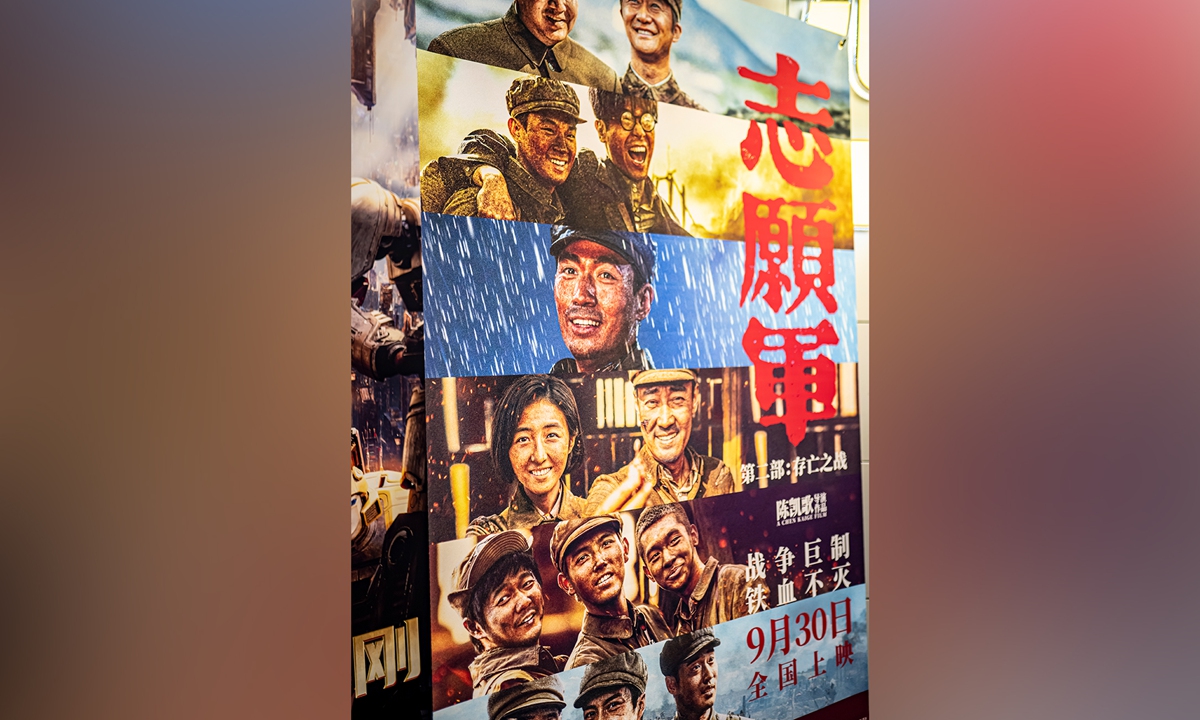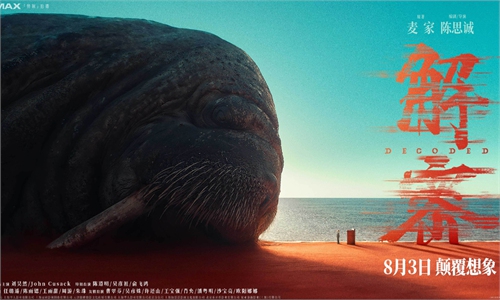ARTS / FILM
New franchise of ‘The Volunteers’ expected to ignite National Day film season

A poster of The Volunteers: The Battle of Life and Death in a cinema in East China's Zhejiang Province on September 24 Photo: VCG
As the National Day holidays film season approaches, the spotlight falls on The Volunteers: The Battle of Life and Death, the second installment of Chinese veteran director Chen Kaige's The Volunteers trilogy.
Set against the backdrop of the War to Resist US Aggression and Aid Korea (1950-53), the film weaves grand war scenes with delicate character portrayals, showcasing the bravery and sacrifice of the Chinese People's Volunteer Army (CPVA), as well as their unwavering commitment to peace amid adversity.
Many audiences who attended a pre-screening event told the Global Times that the second installment offers a clearer narrative and story compared with the first, with more nuanced and touching character depictions.
Chen shared at the pre-screening that filming was akin to being on a battlefield. The entire creative team spent three months filming one main battle. The extensive trenches filled with smoke and the relentless bombardment of war paint a picture of cinematic quality and epic scale.
Chen emotionally stated, "This film encompasses my respect for the Chinese People's Volunteer Army. The spirit of these brave soldiers who fought valiantly will surely be passed down through the generations."
Indeed, many cast members noted that The Volunteers: The Battle of Life and Death is not just a war film, it is a tribute to the resilience and spirit of the CPVA. It is a poignant reminder of the sacrifices made for peace and a testament to the enduring human spirit.
"After filming a scene, when I went back to check the playback, I feel like I was watching a documentary," Chinese actor Zhu Yawen, who plays the role of a military expert, said at the pre-screening.
His comment was echoed by the other actors in the film, who recalled the realistic and arduous filming conditions that moved them to tears many times.
They were moved not because of the tough filming conditions, but because they strongly resonated with the stories of the Chinese soldiers who devoted all they had to fight in the front-line under adverse conditions where the equipment and food supply were far inferior to those of the enemy.
The authentic portrayal of war scenes immersed them in the story of the film, allowing them to better understand the fearless spirit of the CPVA soldiers, who sacrificed their lives in the service of their country, and to interpret with sincerity a piece of history that must not be forgotten.
Amid the cruelty of war, soldiers are also human beings, and they also miss their families and yearn to reunite with them after the war.
In the film, a piece of candy symbolizes the touching story of a CPVA soldier's family uniting and parting during the war. The father gives the candy to his son, and the son later gives it to his younger sister, but he still keeps the sweet wrapper. Before he presses the button that will ignite the explosives, as he prepares to die with the enemy, he opens the wrapper again and licks the candy wrapper with his tongue. At that moment, he smiles, seeming to get a taste of reunion with his beloved family. In such a harsh environment, a piece of candy represents extraordinary sweetness.
Many moviegoers were moved to tears by the story. On each seat in the theater, the cinema prepared a small bag for the audience members that included a handkerchief, a small card to commemorate the CPVA and a piece of candy.
I opened the wrapper of the candy and put it into my mouth. At that moment, I felt an overwhelming sweetness. "This is the sweetest candy that I have ever tasted," I whispered in my heart.
The author is a reporter with the Global Times. life@globaltimes.com.cn




